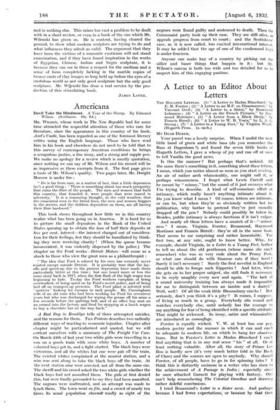Americana
Devil Take the Hindmost. A Year of the Slump. By Edmund Wilson. (Scribners. 10s. 6d.) MR. WILSON, whose work in The New Republic had for some time attracted the respectful attention of those who care for literature, since the appearance in this country of his hook, Airel's Castle, has been regarded as one of the foremost literary critics using the English language. Those who have read him in his book and elsewhere do not need to be told that to this survey of contemporary American conditions he brings a scrupulous justice, a fine irony, and a strong and supple pen. We make no apology for a review which is mostly quotation, since nothing we can say of Mr. Wilson and his record will be as impressive as these excerpts from it. The first page gives a taste of Mr. Wilson's quality. Two pages later, Mr. Dwight Morrow is under fire : "He is far from sure, as a matter of fact, that a little depression isn't a *ood thing : There is something about too much prosperity that ruins the fibre of the people. The men and women that built this country, that founded it, were people that wore reared in adversity.' It is a reassuring thought, in the cold weather, that the emaciated men in the bread lines, the men and women beggars in the streets, and the children dependent on them, are all having their fibre hardened."
This book shows throughout how little we in this country realize what has been going on in America. It is hard for us to picture the small depositors in the Bank of the United States queuing up to obtain the loan of half their deposits at five per cent. interest—the interest charged out of considera- tion for their feelings, lest they should be humiliated by think- ing they were receiving charity ! (When the queue became inconvenient, it was violently dispersed by the police.) The chapter on the Ford works—Detroit Motors—will come as a shock to those who view the great man as a philanthropist :
"The idea that Ford is adored by his men has certainly never existed except outside Detroit. It is probably true that the lay- offs and speed-up due to the present depression have made them particularly bitter at this time ; but one heard more or less the same story back in 1917, when the first flush of the high wages was beginning to fade. To-day the Ford workers complain of being overworked, of being spied on by Ford's secret police, and of being laid off on trumped-up pretexts. The Ford plant is infested with ' spotters ' looking for excuses to sack people. Mr. Cunningham tells of an old man who had been working for Ford for seventeen years but who was discharged for wiping the grease off his arms a few seconds before the quitting bell, and of an office boy sent on an errand into the factory and fired for stopping at a lunch wagon to buy a chocolate bar on the way back."
A Bad Day in Brooklyn tells of three attempted suicides, and the reasons for them. Two Protests describes two radically different ways of reacting to economic injustice. Chapter after chapter might be particularized and quoted, but we will content ourselves with a summary of The Freight Car Case. On March 24th of last year two white girls were travelling in a van on a goods train with some white boys. A number of coloured boys got in, and a fight started. The black boys were victorious, and all the whites but one were put off the train. The evicted whites complained at the nearest station, and a wire was sent along to take the black boys off the train. At the next station nine were arrested, not all from the same car. The sheriff and his crowd asked the two white girls whether the black boys had not assaulted them. The girls at first denied this, but were finally persuaded to say they had been assaulted. The negrocs were maltreated, and an attempt was made to lynch them. The town went en fife, and a crOwd of nearly ten times its usual population cheered' madlyas eight of the negroes were found guilty and sentenced to death. Then the Communist party took up their case. They are still alive, as appeals progress from court to court ; and the Scottsboro' case, as it is now called, has excited international interest. It may be added that the age of one of the condemned boys is under fourteen.
Anyone can make hay of a country by picking out the sillier and baser things that happen in it : but Mr. Wilson's canvas is both too wide and too detailed for us to suspect him of this engaging pastime.


























 Previous page
Previous page